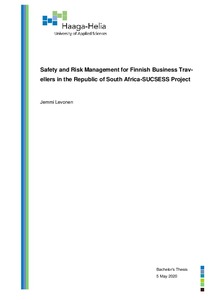Safety and Risk Management for Finnish Business Travellers in the Republic of South Africa-SUCSESS Project
Levonen, Jemmi (2020)
Levonen, Jemmi
2020
All rights reserved. This publication is copyrighted. You may download, display and print it for Your own personal use. Commercial use is prohibited.
Julkaisun pysyvä osoite on
https://urn.fi/URN:NBN:fi:amk-202005128616
https://urn.fi/URN:NBN:fi:amk-202005128616
Tiivistelmä
The aim of this thesis is to provide an insight into the current risks a Finnish business traveller may encounter on travel to the Republic of South Africa. Suggestions on how to manage the risks before they occur are also given as a solution. The goal is to improve the safety of the Finnish business travellers and particularly of those from Haaga-Helia University of Applied Sciences who will be travelling to the destination for the SUCSESS Project by Erasmus+.
The theoretical framework consists of theory on business travel, the possible motivations the business travelers may have as well as a look at the current trends in business travel. Theory goes further into the concept of risk, the Republic of South Africa as a destination and what are the possible risks and the ways to manage the risks.
The methodology focused on qualitative research with a semi-structured interview. The interviews were conducted 30.03.2020-06.04.2020 with phone or Skype. The 8 interviewees were all Finnish and had travelled to the country within three years for work purposes.
The results showed that each was aware of the risks, such as high crime rates, but no one considered the country should be avoided, rather the advice was to use common sense and move together if possible and in daylight in safe areas. The most common risks mentioned were traffic safety, moving in unsafe areas, demonstrations, occasional blackouts and the possibility for crime. Other risks were also mentioned, but there were different views between the interviewees, and some considered some risk more severe than the other.
To conclude, the findings from the knowledge base and interviews showed that the Republic of South Africa does have risks, but all of the interviewed people had a positive image of the destination at the end. The best way to manage risks was to think before acting, check transportation in advance and ask local acquaintances for their advice a well.
The theoretical framework consists of theory on business travel, the possible motivations the business travelers may have as well as a look at the current trends in business travel. Theory goes further into the concept of risk, the Republic of South Africa as a destination and what are the possible risks and the ways to manage the risks.
The methodology focused on qualitative research with a semi-structured interview. The interviews were conducted 30.03.2020-06.04.2020 with phone or Skype. The 8 interviewees were all Finnish and had travelled to the country within three years for work purposes.
The results showed that each was aware of the risks, such as high crime rates, but no one considered the country should be avoided, rather the advice was to use common sense and move together if possible and in daylight in safe areas. The most common risks mentioned were traffic safety, moving in unsafe areas, demonstrations, occasional blackouts and the possibility for crime. Other risks were also mentioned, but there were different views between the interviewees, and some considered some risk more severe than the other.
To conclude, the findings from the knowledge base and interviews showed that the Republic of South Africa does have risks, but all of the interviewed people had a positive image of the destination at the end. The best way to manage risks was to think before acting, check transportation in advance and ask local acquaintances for their advice a well.
